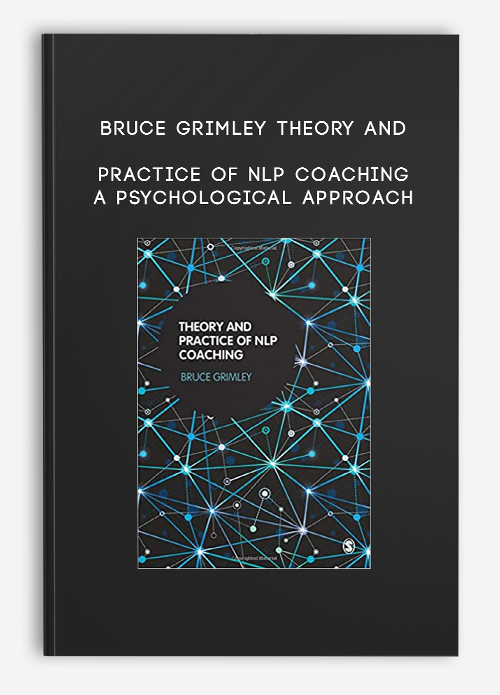Theory and Practice of NLP Coaching: A Psychological Approach by Bruce Grimley
$27.00
Product Include:
File size:
- Description
Description
Theory and Practice of NLP Coaching: A Psychological Approach by Bruce Grimley
**More information:
Get Theory and Practice of NLP Coaching: A Psychological Approach by Bruce Grimley at bestoftrader.com
Description
Bruce Grimley
Theory and Practice of NLP Coaching
A Psychological Approach
‘Inspiring, stimulating, and immensely rich – Bruce takes NLP in Coaching to an entirely new dimension, building on the giants before him’ – Katherine Tulpa, Global CE0, Association for Coaching
‘I recommend this book whole heartedly to any coach who wishes to update their knowledge and understanding of NLP and coaching’ – Prof. Dr. Karl Nielsen, IN President
‘Immensely readable and well researched. No NLP practitioner wanting to develop the field further should be without it’ – Dr Jane Mathison, formerly research officer in NLP, University of Surrey
Are you struggling with the complexities of Neuro-Linguistic Programming (NLP)?
You’ve come to the right place. This book demystifies NLP, providing a practical guide to understanding the psychological theories, principles and research that underpin the approach.
Packed with practical hints and tips, case studies and exercises, the book introduces and explores:
What NLP coaching actually is
The general theories and principles that underpin the NLP approach
How theory translates into practice
The research evidence that says NLP coaching really works
This is an essential companion for trainees, coaches, psychologists and professionals from all walks of life – indeed, anyone wanting to develop their knowledge and practical skills in this increasingly popular approach.
Bruce Grimley is Managing Director of Achieving Lives Ltd, an Associate Fellow of the British Psychological Society and the UK President of the International Association of NLP Institutes and Coaching Institutes.
‘This book looks at the psychology behind NLP and demystifies many apparent contradictions. If you are into NLP or into Coaching at a professional level you must have this book in your collection. I recommend it whole heartedly to any coach who wishes to update their knowledge and understanding of NLP and coaching’ –
Prof. Dr. Karl Nielsen, IN President
‘Bruce Grimley has produced an excellent work on NLP Coaching regarding NLP premises about communication, framing, and reframing. The book uniquely contributes by examining NLP history and focus on therapy as well as research’ –
L. Michael Hall, Ph.D., author of numerous best selling books in NLP and Coaching Co-founder of Neuro-Semantics and the meta-Coaching System
‘Bruce’s book is immensely readable and well researched. No NLP practitioner wanting to develop the field further should be without it’ –
Jane Mathison, formerly research officer of NLP, University of Surrey ****
*’Inspiring, stimulating, and immensely rich – Bruce takes NLP in Coaching to an entirely new dimension, building on the giants before him’ –
* Katherine Tulpa, Global CE0, Association for Coaching
‘A useful study which challenges evidence about the topical arena of NLP Coaching. This book raises debates and encourages reflection about our current philosophies and practice and forces a focus on self development that is congruent with the ever changing landscape’ –
Dr Sally Vanson Behavioural Change Consultant, Executive Coach and Certified Master Trainer of NLP
‘The Theory and Practice of NLP Coaching is a well written, entertaining and profound introduction into NLP and its application to coaching and life. Bruce Grimleys’ detailed explanations take the reader beyond NLP’s new coaching techniques to the source of the techniques…… the “NLP” paradigm shift in personal learning. It manages this enthusiastic proselytizing while clearly presenting the current professional inadequacies and the need for a more systematic organization and understanding of the materials. “By Jove I think he got it”‘ –
Frank Bourke PhD, Executive Director Research and Recognition Project
‘Bruce Grimley has taken the minefield which can be NLP and transformed it into a goldmine of well researched and referenced models, analysing and linking their source back to related fields – thus providing an historical trail of how NLP has been modelling excellence over the years. In the second part of his book, Bruce then goes on to challenge some of the current practices in NLP, and offers his considered view on where improvements can be made. Perhaps the NLP community could consider his advice as constructive feedback and take further steps towards creating a more stable future for NLP?’
Karen Moxom, MD of the Association for NLP and author of ‘The NLP Professional’
‘Bruce offers an easy to read, yet in depth critical discussion of NLP in the present day. Rarely have I seen a text that is so well researched and so well argued. I feel it contributes to a greater level of understanding of both the history and the present use of NLP, generally and in coaching practices. The text is academic without being pretentious and woven within the text are reflections and exercises to enhance the readers understanding and application of the tools and techniques outlined. I would highly recommend this to anyone who wishes to understand more of where NLP comes from, of the basis of NLP in practice. I would say it was essential reading for anyone training NLP to understand the field more fully’
Associate Professor, Dr Suzanne Henwood
‘This text provides a responsible and professional look at the Neuro Linguistic Programming (NLP) coaching specialisation. It is a very readable and well researched book making its subject equally approachable by veteran practitioners and aspiring coaches faced with specialisation choices. Chapters are concise, harmoniously combining theory and practice. The practical hints and tips, the case studies and the exercises provided make the transition from theory to practice simple and elegant. Bruce Grimley presents us with a critical academic discussion of NLP, its roots, its practice and the challenges it faces in order to maintain the growth and professionalisation of NLP coaching. This is an eloquently written text that is recommended reading for coaches and not only for NLP practitioners’
(Prof. Michael L. Kreindler, Israel 2013-06-03)
‘This thoughtful exploration of NLP principles in the context of coaching uses (and credits) the human givens APET model as a point of reference. The author, a psychologist, aims not just to describe useful NLP techniques, although these are plentiful and vividly presented, but to capture the ‘spirit’ which, he says, is found in the underlying conceptual assumptions, ontology and epistemology which generate the techniques , and to highlight the many psychological strands from which NLP draws’ (Human Givens Volume 20 N 1 2013-07-10)
As the title implies, this book offers an excellent balance of theory and practice throughout, making it an easy, enjoyable and highly informative read. It offers a mix of exercises, case studies and practical hints and tips throughout. This brings the theory to life, demonstrating well how the theory translates into practice. This book would be a very useful resource for any coach, with or without previous experience of NLP, and I would highly recommend it. (Jayne Hildreth Association of Integrative Coach-Therapist Professionals Journal 2013-10-10)
This book makes a useful and informative contribution to the field of practice. I came away with a greater understanding about what NLP is, and what it is not; why it has proved challenging to investigate through more traditional psychological methods and how it might be possible to find a middle ground in the polarised views that have characterised much of the debate about NLP until now. (Professor Sarah Corrie The Coaching Psychologist).
Selfhelp course
Self Help – Self Help online course
More information about Self Help:
Self-help or self-improvement is a self-guided improvement—economically, intellectually, or emotionally—often with a substantial psychological basis.
Many different self-help group programs exist, each with its own focus, techniques, associated beliefs, proponents and in some cases, leaders.
Concepts and terms originating in self-help culture and Twelve-Step culture, such as recovery, dysfunctional families, and codependency have become firmly integrated in mainstream language.
Self-help often utilizes publicly available information or support groups, on the Internet as well as in person, where people in similar situations join together.
From early examples in self-driven legal practice and home-spun advice, the connotations of the word have spread and often apply particularly to education, business,
psychology and psychotherapy, commonly distributed through the popular genre of self-help books.
According to the APA Dictionary of Psychology, potential benefits of self-help groups that professionals may not be able to provide include friendship,
emotional support, experiential knowledge, identity, meaningful roles, and a sense of belonging.















